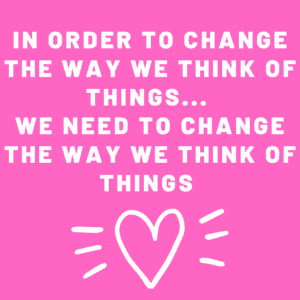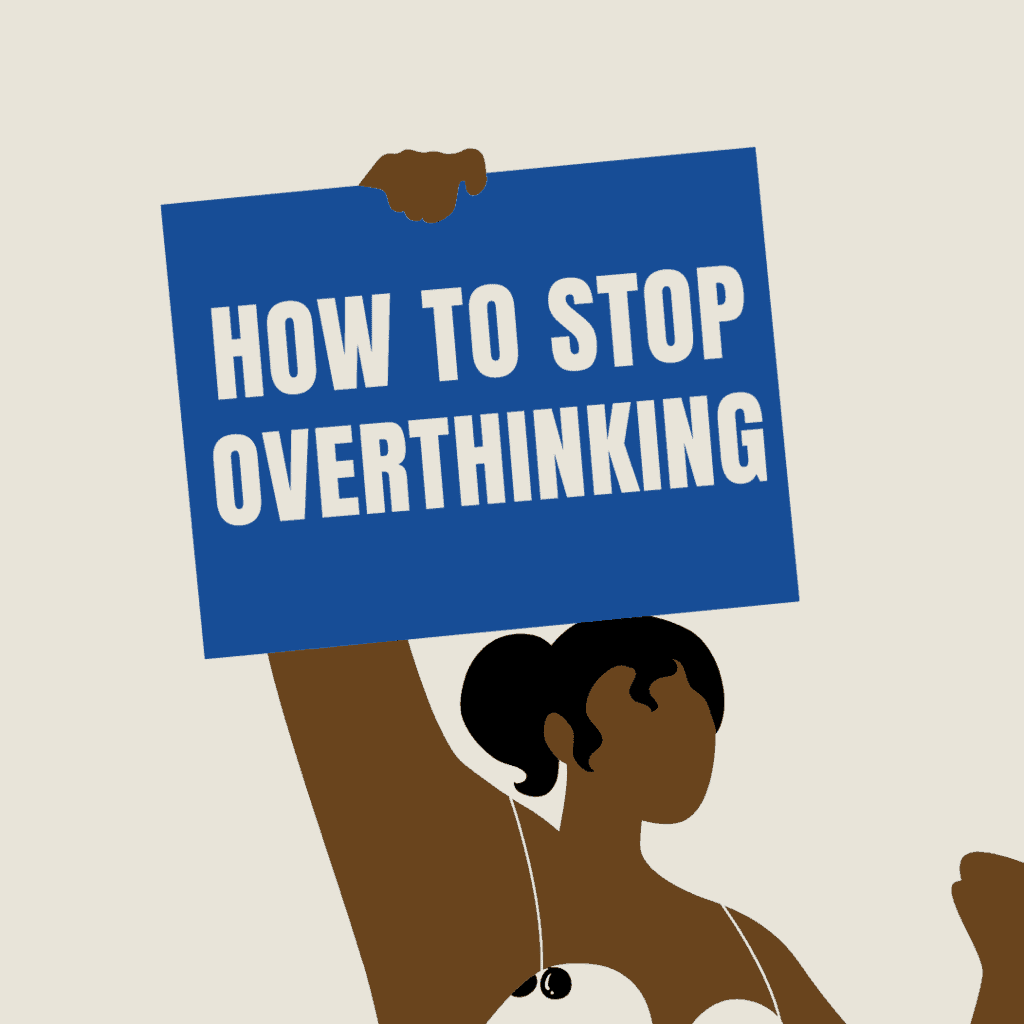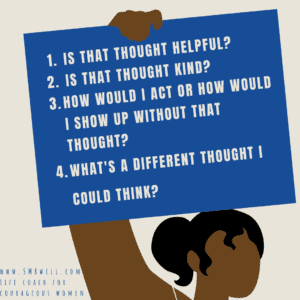Podcast: Play in new window | Download
Subscribe: Apple Podcasts | Spotify | Amazon Music | RSS | More
How to Stop Overthinking
We all do it. Our primitive brain sends us a thought and we find ourselves holding on to it, ruminating, thinking about it over and over. Overthinking leads us to thought drama, catastrophic thinking, worry, anxiety, and many more things we really don’t want. Listen in to this week’s episode to learn how to stop overthinking.
If you’re new to neuropsychology or cognitive coaching, grab my podcast roadmap here as it will insure that you have the basic framework to best support you.
New Thinking Required
The thoughts we routinely think create our reality. If we think we can, we can. When we think we can’t, we can’t.
If we think our husband doesn’t get us, he doens’t. When we think our daughter is struggling, in our mind, she is. My question is, is that how you want to be feeling about the things in your life? About your son? Daughter? Husband? Self?
Listen in to this week’s episode of the love your life show to learn three steps to stop overthinking and to take back control of our brain.
1. Awareness
The first step to stop overthinking is to become aware that we are doing it. In order to stop overthinking, we need to notice, without judgment, that we are overthinking. That we are choosing thoughts that don’t support our forward momentum, that don’t support the type of person we want to be or become. awareness. Mindfulness. consciousness. Notice it. One way to do this is to journal for 2-3 minutes every day for a week. Get your thoughts out on paper to see which thoughts are the ones you practice over and over. Are they worried thoughts about your kids? Maybe you’re thinking annoyed thoughts about your spouse or partner? Are they frustrated thoughts about your self and your self care? Or might they be limiting thoughts about your future and your purpose? In conclusion, the first step is to become aware of the thoughts you practice.
2. Deliberate Thinking
It’s time to get deliberate. To use our super computer of a brain deliberately to stop overthinking. This means we use our awareness from step one to replace unhelpful thoughts with more helpful ones. Duh, right? And yet, do we deliberately do this? If you’re anything like me and other humans, we get stuck in step one. We are aware of our thoughts and end up complaining and feeling like there’s nothing we can do. Your husband’s an a$$, okay? Nope. Not okay with me. That’s like saying, I’m out of shape and there’s nothing I can do. If you want things to change, you get to change things.

Start with step one and notice what you commonly think about. Move to step two and choose which thoughts are unhelpful in order to replace them with more helpful ones. You want to be consistently asking your brain whether the thoughts you’re thinking are leading you towards your goals and the life you want to be living and which are not.
How to do this?
I have a four step turnaround, based on Byron Katie‘s work and ameliorated by Jon Acuff. Run your thought through this four question filter:
- Is that thought helpful?
- Is that thought kind?
- How would I act or how would I show up without that thought?
- Whats’ a different thought I could think?
Asking yourself these four questions (or even one of them) will help you move out of automatic thinking into more conscious, powerful thinking.
3. Practice
Step three is to deliberately and consistently practice. Practice, practice, practice. I can not say this enough as many of us give up on this step. We throw up our hands and say something like “well that didn’t work”. Whereas it’s that we haven’t practiced long enough. If you’re looking to get more muscle definition, you may choose to go to the gym and lift weights. If, after a week, you’re not where you want to be, do you say “well that didn’t work?”. Some do. I’m encouraging you to take the different path.
I practice my new thoughts in many ways and supporting midlife women in their practice is a backbone of my monthly membership. One way I do this is to write the new thought on a sticky note that I can see wherever the old thought used to come up. For example, for many years I had a sticky on my bathroom mirror saying: I’m the type of woman who cares for her body. This helped me replace my older more negative body thoughts with a more empowering one.
Furthermore, another way I practice is by choosing the top 3-5 thoughts I’m practicing and writing them in a notebook every morning.. Thoughts that wire together, fire together. Similar to creating a new habit of prioritizing sleep or going to the gym, practice is needed.
There you have it. How to stop overthinking in three steps. Once I lay those three steps out, I get many questions. I addressed the main ones in this week’s podcast episode here.
Thought Babies
One final point on your journey to stop overthinking and to establishing more helpful thought patterns. Please think of your new thoughts and patterns of thinking as thought babies that need gentle handling and protection. Protect their sweet little selves. When I was reprogramming how I thought about myself and business, I didn’t go to my dad and tell him the new thoughts I was practicing about myself and possibilities in business. Thought babies are extra susceptible to criticism and it’s our job to protect them. To only share them with those who have shown they’re growth minded, your soul supporters.
Support Staff
If you don’t have any of these people in your life, please enroll in the Love Your Life School. This is a lot of what we do: offer a safe environment for thought babies to germinate. We help those thought babies grow and expand. When you’re learning new ways of thinking, I recommend either getting into a group or getting an individual coach. So much of this work is noticing and becoming aware of the thoughts we are thinking that don’t support our best self, the life we are here to live. And, when we do that, we uncover some programming that can be rooted in trauma or in unmindful parenting. Working through this with a coach is instrumental as it moves you out of the blame game and into the feel better game. I want more of us playing the feel better game.
As I often say, life is not all rainbows and daisies. Life is full of uncomfortable emotions. Join a group or get a coach to help you in that discomfort. Some friends and family will support you in avoiding that discomfort. That’s not part of evolving. Rather, that gets you more of what you’ve got. Lean on the people who help you feel the discomfort and do it anyway.
Soul Supporters
The main thing I see holding people back is thinking we need to do it alone or we should be able to do it all alone. Life can be short, dear warriors. Why not fast track your ticket to feeling better and hire someone? When I used to be a nutritionist and personal trainer, people hired me all the time to fast track their path to health. There is nothing more important than our brain. It runs it all.
How much care are you giving to managing that mind? To making sure the thoughts you’re thinking support the future you want and the life you want to be living. I know so many people plan ahead and choose the clothes they’re going to wear before a presentation. Yet those very same, highly intelligent go getters often don’t choose the thoughts they’re going to think before the presentation. Let’s shift that. We have so much more control than we think. Feeling in control of my feelings and my thoughts is what brings me ease and peace and allows me to live a life I love. It’s not always easy, it’s something I’m practicing quite often, yet it is always worth it.
Join me. In the monthly membership or as a one-on-one client if I have room. Big hugs to you









